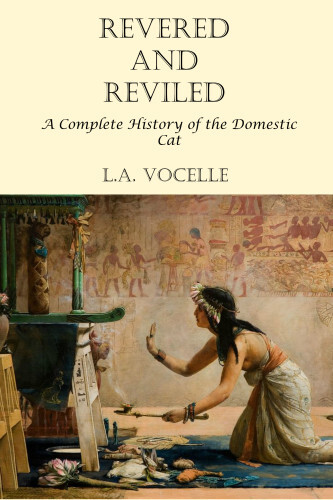L.A. Vocelle's Blog
September 20, 2024
Omega and Alpha
Omega and Alpha
by John A. Tures
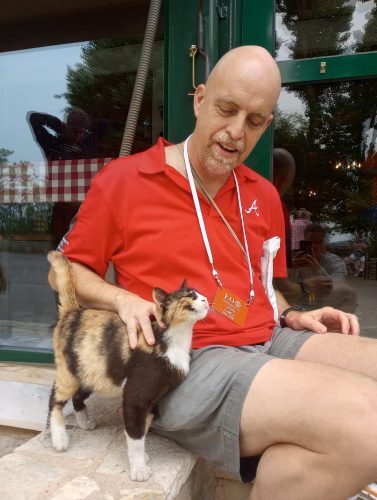
John A. Tures with Cat
John A. Tures is a regular newspaper and magazine columnist and college professor who has also published several short mysteries, suspense and thriller stories. These include “Deep Plots,” “Prime Time Crime Drama,” “Publish or Perish,” and “The Very Error of the Moon.” He has also published the non-fiction story “Bridge Builders,” and the flash fiction story “The Sophist.” He has several other fictional mystery, suspense and thrillers forthcoming: “The Propagandist,” “The Deregulator,” “LaGuerrera,” as well as the nonfiction piece “Rodeo Clown vs. Heavy Metal.” He now lives in LaGrange, Georgia.
“Well, what brings you here?” Dr. Isaiah Piven asked the small black cat, shivering in the New Year’s Eve snow outside the nursing home known as Poplar Creek Manor.
The rational side of the doctor’s brain said to leave the stray. Did it have a good temperament? Was it well-trained? Could it carry diseases? But the emotional side won out. The physician was rewarded with a cute mew, a snuggle, and the start of a very long purr in his warm overcoat.
Neither his rational side nor his emotional side had any idea of the real consequences bringing this black cat into his medical facility, and his life, would have.
“She’s so cute!” Libby, the student nurse gushed as Dr. Piven brought the orphan inside. “Can we keep her here? I’d take her home, but you know Jonas is allergic.”
Piven nodded at his plus-sized colleague. Her rail-thin young husband was sweet but suffered from a myriad of allergies.
“Well, if she’s indoor trained, properly fed, and doesn’t get underfoot,” he began, but he could see the blonde already searching on PetSmart’s website for kitty litter and cat food.
By the next shift, she had purchased the box and a pair of bowls for water and food. The doctor sighed. But their new arrival seemed to know exactly what to do.
“She needs a name,” Piven declared.
“How about Omega?” Libby offered. “That means the end. And didn’t you find her on the last day of the year?”
The cat became a hit with the nursing home residents. During the daytime, she made rounds with Dr. Piven or Nurse Libby, lounged in the TV room, and appeared at mealtimes, munching on snacks handed down from friendly diners. But at night, she chose to stay in Mrs. Antonia Vitelli’s room for the first few weeks, until one fateful night.
“Strangest thing,” Nurse Libby told Dr. Piven. “Mrs. Vitelli seemed to be doin’ well. Doctors in Asheville gave her a clean bill of health and said the infection in her arm would heal with medicine. Then wham—she passed away. Just like that.”
Piven nodded sadly. “We’ll all miss her, especially Omega.”
Libby shook her head. “Our little black cat has already made a new friend: Ray-Ray.”
“Oh,” the physician remarked. “Did you move the cat’s bed to his room?”
“Omega doesn’t sleep in her bed,” the nurse explained. “She naps on the bed with the patients when she stays with them.”
Doc Piven frowned. His next stop would be Mr. Murphy who was in his room, lying on his side. Omega was curled up by his leg. Ray-Ray, as he was known, was awake, pointing to his red shirt identifying him as part of the Arkansas Football fan club.
“You ever play football?” he asked.
Piven smiled while Libby rolled her eyes. Same old question. “I tried out but didn’t make the squad.”
“I played for the Razorbacks,” he announced proudly. In his prime, Ray Murphy was a defensive lineman, though decades later, he looked shrunken, smaller than a safety now.
“I remember,” the doctor said off-handedly, but looked at Omega’s position. She was scrunched up against one of Ray-Ray’s legs.
Piven looked at Libby. “Did he sleep like that with Mrs. Vitelli?”
Her eyes went wide. “Oh no—he slept by her arm.”
“The one with the bacterial infection that was being treated last year?”
“I think so,” she gasped. “I’ll check the charts to confirm it.”
Dr. Piven reached down and held his hand out to Omega. She briefly abandoned her position and purred like an Evinrude motor when he scratched her cheeks, neck, and chin, and gobbled up the snack he carried in his lab coat. But as soon as he was done petting her, she resumed her post, barely regarding the comfy bed Libby had deployed in the corner.
“How long has Omega been doing that?”
The nurse hooked her finger inside her lip, contemplating. “Since Ray-Ray’s fall during the hospital visit, I think.”
On a hunch, he called Ray-Ray’s physician in Asheville. “When Mr. Murphy fell the other day, did you notice anything unusual about his legs?”
“Just the broken hip, scrapes and bruises,” his colleague claimed.
When he caught up with Libby, Piven decided to play a hunch. “Have the weekend team monitor Ray-Ray a little closer than usual, okay?”
But that hadn’t been the case, as those on duty Saturday and Sunday were business as usual. Monday morning, their worst fears were confirmed.
“The medical examiner said it was an undetected blood clot in the leg,” Libby explained through her tears. “The doctors in the hospital missed it when treating him for the fall.”
After reviewing the M.E.’s files, Piven asked “Where’s Omega now?”
“T.V. Room.”
The doctor breathed a sigh of relief. As Auric Goldfinger said in Ian Fleming’s James Bond book bearing his name “Once is happenstance. Twice is coincidence.”
He didn’t want to think about the third.
Omega’s routine seemed normal, though some patients and a few nurses began giving the black cat a wide berth. But after a few weeks, she began hanging around with Sonny Whitt, who was easily the most active resident at Poplar Creek Manor.
“His doctors gave him a clean bill of health last week,” Libby pointed out, looking at his charts. “Sonny even petitioned to run the Memorial Day 5k, or at least walk it.”
He visited the man who was again sipping an energy drink. He had slicked hair, thick glasses and running shorts, sporting a t-shirt from some long-ago race. “How are you feeling?”
“Great, Doc! Never better!” Sonny was perpetually cheery.
“Omega bothering you?”
“Of course not. I love having this little kitty around.”
“Can I convince you to get another physical, just in case?”
“I’ll schedule one at the end of the month when I’m due,” he promised. “That is if you’ll sign off on letting me run the Peachtree Road Race this summer!” He reached for another energy drink.
Piven laughed and waved him off. “Maybe I’ll let you walk a nice cool 5k sometime this Fall if you keep up the good health.”
But Sonny didn’t. The next day, summoned by the alarm, he found one of the nurses, Jonaka, kneeling by the runner’s body. “What happened?”
“Massive coronary, I think” Jonaka sighed as the other attendants tended to Sonny. “He was sitting on the edge of his bed, tying his shoes, talking to me, when he simply keeled over. He was dead before he hit the floor.”
“The final report confirms it,” Libby told Piven. “He had massive blockage in a key artery, yet seemed to be doing just fine, until he wasn’t. I was worried about all of those energy drinks he sipped on. But nobody knew this would happen.”
“Except Omega.” The doctor eyed the black cat, intently watching the others in the lounge.
“I’m Aria Martin, NBC News, here in Hendersonville, North Carolina, at the Poplar Creek Manor, a nursing home where a little black cat named Omega has an uncanny ability to detect when residents have only a short time to live, better than doctors themselves.”
The reporter launched into Omega’s origin story, and what happened when she watched over other residents.
“Doctor Piven, to what do you attribute this amazing cat’s ability to determine when patients have a serious affliction or problem?” she began.
The older physician stroked Omega in his lap. “There are stories about dogs being able to detect some cancers, but the science is still out on that. Animals have a much better-developed sense of smell than humans in general, and cats seem to have a sixth sense. We do know that cats react strongly to certain changes in humans. Perhaps what this shows is that we need more research into what our pets can tell us.”
After the interview, Omega jumped off his lap and ambled down the hallway. Piven apologized to the journalist for leaving suddenly and followed the feline. She ducked into the room of perhaps the doctor’s favorite patient, Gwendolyn Sanders.
The African American woman raised the top part of her bed, so she was in a semi-sitting position. Omega snuggled up by her chest.
“Do you know about Omega and her—ability?” the physician asked nervously.
She nodded. “Some call her the death cat, and keep away, but I like having her around. She’s right by my lungs. I can feel the changes too. Shoulda never started smoking as a teen. I’ve lasted a long time, but Omega is telling me it’s the end.”
Dr. Piven remembered that Gwendolyn’s pulmonologist speculated weeks ago that she would probably live on those lungs for a while despite her past behavior. But Omega was thinking otherwise.
“Are you scared of dying, Gwen?”
She shook her head. “I’ve lived a good long life. Omega is giving me the sign to bring the family around one last time, instead of waiting for the summer, like we originally planned. Plus, I can get my affairs in order.” She stroked Omega behind the ears, as the cat gave an appreciative purr.
A week later, after Gwen’s family reunion, Libby’s tears told the doctor all he needed to know. “I—I’m happy she’s in a better place,” the nurse sobbed. “I’m gonna miss her.”
“Me too,” he admitted. “You know. I was thinking about that interview. Most doctors seem skeptical about dogs and cats detecting diseases or other medical problems, and our sample size is too small. But if I can convince some donors to invest in a bigger study with these animals and what they can show us, maybe we can find a way to help patients.”
“And the pets.” the nurse insisted. “Someone saw the special about Omega and offered to donate one of the kittens among their newborns to us. He is old enough for adoption. Think we should?”
Isaiah Piven, M.D. smiled. “Why not? They could help more patients.”
Late into the evening, the doctor worked on his letter, pitching his research plan to the bigwigs. He knew the medical community in general was skeptical of pet prognostications of clots and cancers. “Hokum at best,” wrote one doctor in a scathing online critique posted below Ms. Martin’s article online. He probably feels threatened, Piven thought. But doctors adapted to using more sophisticated tools and machines throughout history, didn’t they? Physicians should use anything they can to make the patient feel better or ease their suffering.
Exhausted after writing the proposal, Dr. Piven felt unwilling to drive the winding mountain roads to his North Carolina home at that late hour. Sliding into a nearby open bed in an unoccupied room seemed like the more logical choice to him. Sleep came to him quickly.
In his dreams, he experienced a terrifying nightmare, which bordered on hallucination. He was being chased by a lycanthrope, while he struggled to breathe. This had frequently happened to him in real life over the past few months, which he attributed to the cold days and elevation.
Piven awoke with a start. He heard an unfamiliar sound. It was a cat purring, but much closer to his ears. Omega had curled her body over his head! Terrified, he flung himself backward, toppled over the edge of the bed, and hit his head on the hard floor of the Poplar Creek Manor, where all went black very quickly.
He woke, not in the nursing home, but at the hospital in Asheville, North Carolina, where he once made his rounds before his semi-retirement in nearby Hendersonville. A former colleague, years younger, was now tending to him.
“That’s a nasty bump on your head, Isaiah,” his friend said. “But we gave you something for the swelling. That problem should get better in a couple of days.”
Piven smiled, but then realized something was unspoken. “You said that problem, Zeke. Is there something else?”
His former colleague hesitated. “I don’t know how to tell you, but you’ve got Glioblastoma, a type of brain tumor. Unfortunately, it’s malignant, and it’s way too late for us to operate. I’m sorry, but you don’t have much time.”
The phone rang in his room. It was Libby. “Dr. Piven, are you okay? I heard you just regained consciousness.”
“Get that damn cat out of Poplar Creek!” he roared.
“W-w-what?” she stammered.
“He’s an angel of death,” the physician growled. “An assassin. Get her out before she takes out another resident!”
“You can’t be sayin’ this!” she begged. “Tell me what happened.”
He told her the story, from waking up suddenly, to falling out of bed, and then the fatal diagnosis when he awoke. “That’s why Omega’s got to go back from where she came from—today!”
“Wait, what if Omega hadn’t taken a nap by your head?” She shifted from cat-lover to medical professional.
“Then…”
“Would you still have the tumor?” she pressed.
Dr. Piven hesitated, then looked at his doctor pal, Ezekiel Nathanson, who nodded. “Yeah.”
“So, Omega couldn’t have killed you then,” Libby reasoned. “Just as this cat couldn’t have been responsible for Mrs. Vitelli’s infection before Christmas, Ray-Ray’s fall, Sonny’s coronary, or Gwen’s smoking at age fifteen, right?”
“I guess,” he sighed. “Learning that you’ve only got a short time to live will make you say stuff you didn’t mean.”
Her tone indicated that she had already forgiven him. “I’m also really sorry about the brain tumor, and I can’t even imagine working at Poplar Creek without you.”
She choked back a sob or two. He could already feel the pain in her voice for what was about to come.
“Tell you what,” she announced. “I’ll start pulling all the data from the charts of the patients Omega hung out with and get permission from their families to use the information for our study. You focus on writing up what you know. I can visit you in three days and bring you the stuff so we can at least send the proposal out to the donors.”
After a beat, she added. “We can even call it The Piven Project, in your honor, for having discovered it.”
The older doctor shook his head. “I’m thinking ‘The Omega Project’ is a better name. If it wasn’t for that black cat, we wouldn’t have known any of this.”
As promised, Libby showed up with the data, having secured all permission forms from the families of the deceased. They were eager to help the study, she insisted. She also handed him a large card, signed by just about every resident at Poplar Creek Manor, as well as her fellow nurses, doctors, and even the administrator.
“How’s the request for funding the project going?”
“I’ve been working on it nonstop. It’ll be done by the end of the week,” he insisted.
“Do you have enough time?” she asked.
“Doctor Nathanson thinks I’ve got at least a month, maybe two,” he rasped. Breathing was getting harder, but he would at least have time to get the proposal sent off. His physician promised to take over the study when the time came.
He noticed his nurse was smiling a little too widely. “Okay, I’m guessing you’ve got some other good news. Did Jonas remember your first anniversary?”
She shook her head but kept her grin. “Remember how you let me take in that new kitten from the family who saw the report about Omega? They said he was born on January 1 of this year, so I named him Alpha.”
“That’s nice.”
“You know how I take a short nap after my lunch break? Well, for the past few days, I’ve woken up with that little white cat Alpha pressed right up to my chest, purring. I grew up with cats and ain’t none of them ever done that.”
She saw the stricken look on Piven’s face. “I was worried that something was wrong with me, that I had breast cancer or somethin.’ But on a hunch, I took a pregnancy test last night.”
Libby paused, then squealed. “I’m finally gonna be a mom!”
He leaned in to take her exuberant hug. “If it’s a boy, I’m namin’ him Isaiah. And if it’s a girl, I’m—well—callin’ her something beginning with the letter I, like Iris or Isabel.”
“So, it sounds like we need to revise the project somewhat,” Dr. Piven concluded. “Maybe the Omega and Alpha Project?”
The nurse nodded. “Just like Omega can figure out when someone is dyin’, lil’ Alpha seems to know when life is comin.’”
Piven looked at the photo Libby brought. The white cat and black cat were curled together in a ball, taking a nap. Yin and yang. Life and death. Both were beautiful together.
The post Omega and Alpha appeared first on THE GREAT CAT.
February 20, 2023
Cats in Film-Harry and Tonto (1974)

By May be found at the following website:https://www.originalfilmart.com/produ..., Fair�� use,https://en.wikipedia.org/w/index.php?...
Harry and Tonto is a touching 1974 road film about an elderly widower who is forced to vacate his New York City apartment and travel across country with is orange tabby cat Tonto. The movie stars Art Carney and Ellen Burstyn and Tonto, who plays himself. Art Carney won an Academy Award Oscar for his portrayal of Harry and Tonto won the PATSY for best animal actor.
The aging Harry starts his journey out by staying with his eldest son, but then decides to travel across country with Tonto by his side. He makes his way to Chicago overcoming various challenges and stays with is daughter, Ellen Burstyn, for a short while. Then he gets back on the road headed west. He eventually ends up in Los Angeles where Tonto dies. At the end of the film, Harry sees a cat that looks just like Tonto and follows him to the beach where he sees a young boy building a sandcastle.
Carney had never been much of a cat lover prior to the film; however, he noted that he wound up getting along well with Tonto. ���Cats are not my favorite animal,��� Carney was quoted as saying in the May 30, 1975 issue of the Times-Advocate (Escondido, CA), ���But I grew attached to this cat.���
Two cats were used in the movie. Paul Mazursky, the director, stated that his favorite shot in the film of the cats was when the handler, laying on a blanket and holding the camera, was pulled down the hallway. The handler used pieces of liver strategically placed around Art Carney to get Tonto to come up to him.
The film met with great reviews. Roger Ebert gave it 4 out of 4 stars.
Stream the film for free HERE.
Want to know more about the cat in literature, art and history? Then Revered and Reviled is the book for�� you. Now available on Amazon in both paperback and Kindle formats.
(function(d, s, id) { var js, fjs = d.getElementsByTagName(s)[0]; if (d.getElementById(id)) return; js = d.createElement(s); js.id = id; js.src = "//forms.aweber.com/form/19/57628519.js&... fjs.parentNode.insertBefore(js, fjs); }(document, "script", "aweber-wjs-6vneq2vrs"));
The post Cats in Film-Harry and Tonto (1974) appeared first on THE GREAT CAT.
July 31, 2022
10 Longest-Lived Cat Breeds
We all wish that our cats would live forever or at least as long as we do, but unfortunately, they do not, causing much grief. If you are thinking of getting a new cat, then you can at least consider these longest-lived cat breeds when making your decision.
1. AMERICAN SHORTHAIR
The American Shorthair lives from 15 to 20 years, topping the list of longest-lived cat breeds. Cost: $500-800.

2. RUSSIAN BLUE
The Russian Blue is next in line and lives from 15 to 20 years. Cost $400-600.

3. SAVANNAH
The Savannah lives from 12 to 20 years and tops this list as most expensive. Cost: $1,000-20,000.

4. BALINESE
The Balinese also lives from 12 to 20 years but costs $650-800.
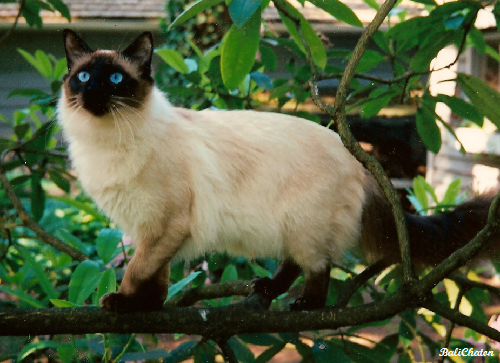
5. BURMESE
The Burmese lives on average from 16 to 18 years. Cost: $600-1000.
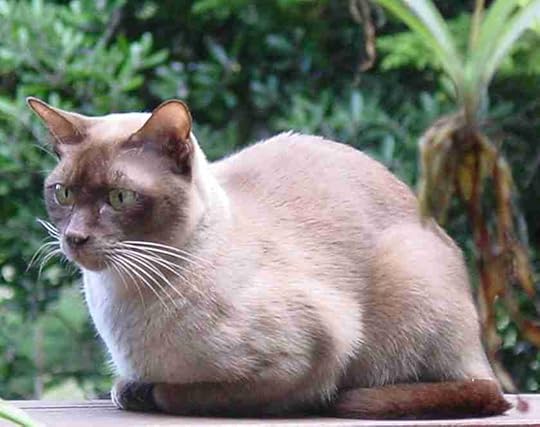
6. BOMBAY
Average life span for a Bombay is from 12 to 16 years. Cost: $500-700.
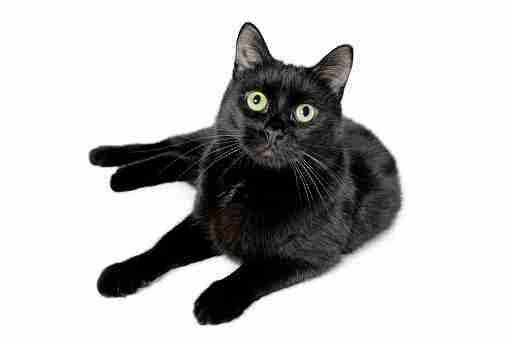
7. RAGDOLL
The Ragdoll lives on average 15 years and costs $800-2000.
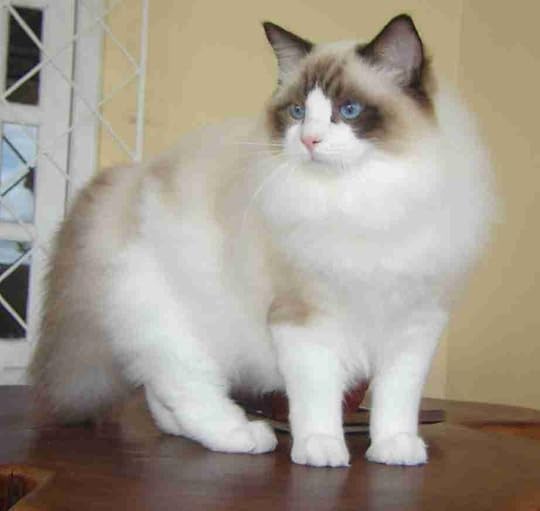
8. EGYPTIAN MAU
The Egyptian Mau lives on average from 12 to 15 years and costs $ 900-2,500.

9. SIAMESE
The Siamese life span is from 10 to 12 years and costs $600-2,500.

10. SPHYNX
The Sphynx is the shortest-lived cat on this list with an average life span of just 10 years. Cost: $1,500-6000.

Want to know more about the cat in literature, art and history? Then Revered and Reviled is the book for you. Now available on Amazon in both paperback and Kindle formats.
(function(d, s, id) { var js, fjs = d.getElementsByTagName(s)[0]; if (d.getElementById(id)) return; js = d.createElement(s); js.id = id; js.src = "//forms.aweber.com/form/19/57628519.js&... fjs.parentNode.insertBefore(js, fjs); }(document, "script", "aweber-wjs-6vneq2vrs"));
The post 10 Longest-Lived Cat Breeds appeared first on THE GREAT CAT.
January 7, 2022
The Hermitage Museum Cats
The famous cats of The Hermitage Museum in St. Petersburg, Russia are indispensable for their rat catching prowess and much loved for their unique beauty. The cats have had a long history in the museum, once the Winter palace of tsars.

Hermitage Museum, St. Petersburg, Russia
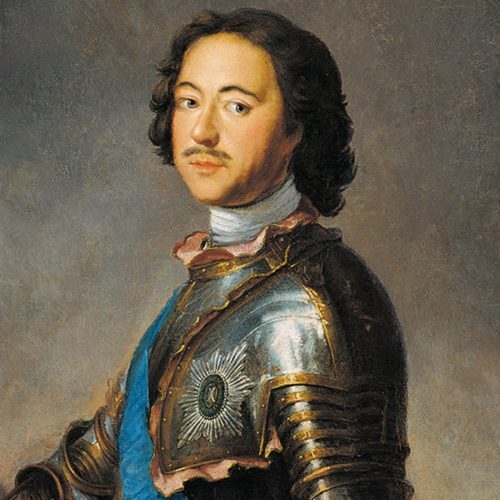
Even though cats were present in Russia from the 13th century, Peter the Great is said to have brought the first cat, Vasily, to the palace from Holland .
In 1745, Peter the Great’s daughter Empress Elizabeth Petrovna requested that 30 cats be brought to the palace to keep rats and mice at bay. Cats were brought from Kazan, an area known for the fiercest felines.
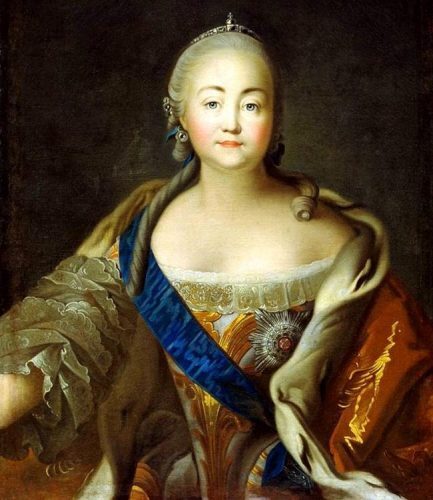
Empress Elizabeth, a portrait by Russian artist Ivan Argunov, decreed that cats be brought to St Petersburg in 1745 to keep the rat population down.
This love and respect of the cat ran in the family, as Catherine the Great also was said to be partial to Russian Blues.
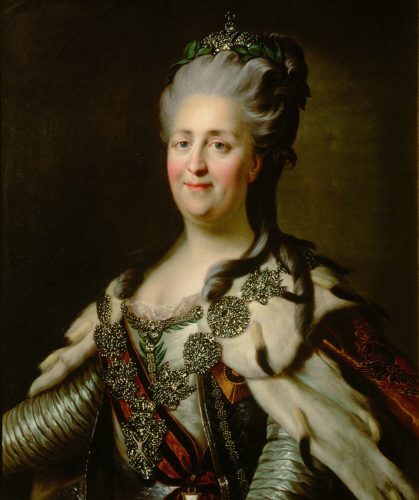
Catherine the Great, J.B.Lampi (1780s, Kunsthistorisches Museum)

Cat of Kazan, anonymous, 1881
The caption above the cat’s head reads: “The Cat of Kazan, in the manner of Astrakhan, by reason of Siberia, lives gloriously, manages agreeably, and farts sweetly.”
During the Napoleonic invasion, cats remained in the palace which, by that time, had become a museum of over 20 kilometres and 10 buildings. The hearty felines also survived the Bolshevik revolution.

Photo Russia Beyond
It was only during WWII that they succumbed to the hardships of war and were killed for food for the starving population. In 1941, valuable works of art were evacuated from the Hermitage and sent to the Urals for safety. Once empty, the Hermitage’s basements were used as bomb shelters. It was during the siege of Leningrad, which lasted from September 1941 to January 1944, that the cats met their demise. As a result, the basements were left unprotected and furniture, walls, communication lines were gnawed by rats that also transmitted disease.
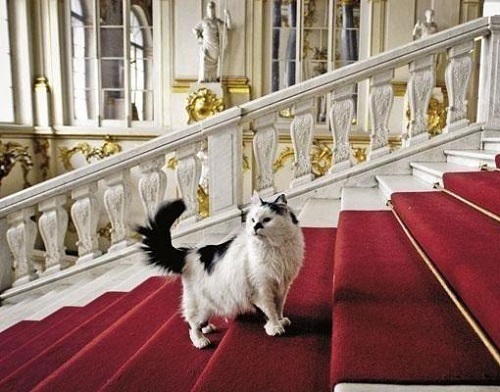
When the news of this destruction reached other Soviet regions, cats were sent to Leningrad. Tyumen was one of the largest collection points for cats, and today celebrates that history with a cat park and statue dedicated to their memory.

Five thousand cats were transported from Tyumen, Omsk, and Irkutsk to Leningrad. The first Blue Smoke cats came from Yaroslavl in 1943. They were considered good rat catchers and were in high demand. Kittens cost ten times that of a loaf of bread.

By 1945, The Hermitage was re-opened, and its cat guardians present. Up until the 1960s, cats roamed the museum and had to survive on their own. In the 1990s, a program was instituted to feed and offer healthcare for the felines. The cat population is limited to 50; additional cats are given away for adoption.
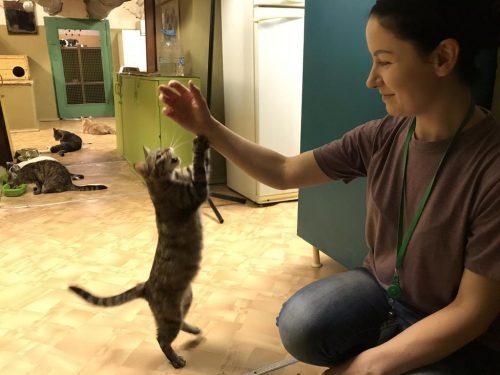
Volunteer worker, Anastasia, plays with one of the cats that live in the basement of The State Hermitage Museum, St Petersburg. Photo Elizabeth Fortescue
An annual holiday, “Catfest” is held in honor of the ancestors of the cats that were originally brought to the palace by Empress Elizabeth Petrovna.
Want to know more about the cat in art, history and literature? Then Revered and Reviled is the book for you. Now available on Amazon in both paperback and Kindle formats.
(function(d, s, id) { var js, fjs = d.getElementsByTagName(s)[0]; if (d.getElementById(id)) return; js = d.createElement(s); js.id = id; js.src = "//forms.aweber.com/form/19/57628519.js&... fjs.parentNode.insertBefore(js, fjs); }(document, "script", "aweber-wjs-j9iv7ndfw"));
The post The Hermitage Museum Cats appeared first on THE GREAT CAT.
July 23, 2021
Zut
ZUT
Guy Wetmore Carryl

Mother and Kittens
Arthur Heyer
Private Collection
Side by side, on the avenue de la Grande Armée, stand the épicerie of Jean-Baptiste Caille and the salle de coiffure (hair salon) of Hippolyte Sergeot, and between these two there is a great gulf fixed, the which has come to be through the acerbity of Alexandrine Caille (according to Espérance Sergeot), though the duplicity of Espérance Sergeot (according to Alexandrine Caille). But the veritable root of all evil is Zut, and Zut sits smiling in Jean-Baptiste’s doorway, and cares naught for anything in the world, save the sunlight and her midday meal.
When Hippolyte found himself in a position to purchase the salle de coiffure, he gave evidence of marked acumen by uniting himself in the holy—and civil—bonds of matrimony with the retiring patron’s daughter, whose dowry ran into the coveted five figures, and whose heart, said Hippolyte, was as good as her face was pretty, which, even by the unprejudiced, was acknowledged to be forcible commendation. The installation of the new establishment was a nine days’ wonder in the quartier. It is a busy thoroughfare at its western end, is the Avenue de la Grande Armée, crowded with bicyclists and with a multitude of creatures fearfully and wonderfully clad, who do incomprehensible things in connection with motor-carriages. Also there are big cafés in plenty, whose waiters must be smoothly shaven: and moreover, at the time when Hippolyte came into his own, the Port Maillot station of the Métropolitain had already pushed its entrée and sortie up through the soil, not a hundred meters from his door, where they stood like atrocious yellow tulips, art nouveau, breathing people out and in by thousands. There was no lack of possible custom. The problem was to turn possible into probable, and probable into permanent; and here the seven wits and the ten thousand francs of Espérance came prominently to the fore. She it was who sounded the progressive note, which is half the secret of success.
“Pour attirer les gens,” she said, with her arms akimbo, “il faut d’abord les épater.”
In her creed all that was worth doing at all was worth doing gloriously. So, under guidance, Hippolyte journeyed from shop to shop in the Faubourg St. Antoine, and spent hours of impassioned argument with carpenters and decorators. In the end, the salle de coiffure was glorified by fresh paint without and within, and by the addition of a long mirror in a gilt frame, and a complicated apparatus of gleaming nickle-plate, which went by the imposing title of appareil antiseptique, and the acquisition of which was duly proclaimed by a special placard that swung at right angles to the door. The shop was rechristened, too, and the black and white sign across its front which formerly bore the simple inscription “Kilbert, Coiffeur,” now blazoned abroad the vastly more impressive legend “Salon Malakoff.” The window shelves fairly groaned beneath their burden of soaps, toilet waters, and perfumery, a string of bright yellow sponges occupied each corner of the window, and, through the agency of white enamel letters on the pane itself, public attention was drawn to the apparently contradictory facts that English was spoken and “schampoing” given within. Then Hippolyte engaged two assistants, and clad them in white duck jackets, and his wife fabricated a new blouse of blue silk, and seated herself behind the desk with an engaging smile. The enterprise was fairly launched, and experience was not slow in proving the theories of Espérance to be well founded. The quartier was épaté from the start, and took with enthusiasm the bait held forth. The affairs of the Salon Malakoff prospered prodigiously.
But there is a serpent in every Eden, and in that of the Sergeot this role was assumed by Alexandrine Caille. The worthy épicier himself was of too torpid a temperament to fall a victim to the gnawing tooth of envy, but in the soul of his wife the launch, and, what was worse, the immediate prosperity of the Salon Malakoff, bred dire resentment. Her own establishment had grown grimy with the passage of time, and the annual profits displayed a constant and disturbing tendency toward complete evaporation, since the coming of the big cafés, and the resultant subversion of custom to the wholesale dealers. This persistent narrowing of the former appreciable gap between purchase and selling price rankled in Alexandrine’s mind, but her misguided efforts to maintain the percentage of profit by recourse to inferior qualities only made bad worse, and, even as the Sergeot were steering the Salon Malakoff forth upon the waters of prosperity, there were nightly conferences in the household next door, at which impending ruin presided, and exasperation sounded the keynote of every sentence. The resplendent façade of Hippolyte’s establishment, the tide of custom which poured into and out of his door, the loudly expressed admiration of his ability and thrift, which greeted her ears on every side, and, finally, the sight of Espérance, fresh, smiling and prosperous, behind her little counter—all these were as gall and wormwood to Alexandrine, brooding over her accumulating debts and her decreasing earnings, among her dusty stacks of jars and boxes. Once she had called upon her neighbor, somewhat for courtesy’s sake, but more for curiosity’s and since then the agreeable scent of violet and lilac perfumery dwelt always in her memory, and mirages of scrupulously polished nickel and glass hung always before her eyes. The air of her own shop was heavy with the pungent odours of raw vegetables, cheeses, and dried fish, and no brilliance redeemed the sardine and biscuit boxes which surrounded her. Life became a bitter thing to Alexandrine Caille, for if nothing is more gratifying than one’s own success, surely nothing is less so than that of one’s neighbor. Moreover, her visit had never been returned, and this again was fuel for her rage.
But the sharpest thorn in her flesh—and even in that of her phlegmatic husband—was the base desertion to the enemy’s camp of Abel Flique. In the days when Madame Caille was unmarried, and when her ninety kilos were fifty still, Abel had been youngest commis in the very shop over which she now held sway, and the most devoted suitor in all her train. Even after his prowess in the black days of 1871 had won him the attention of the civil authorities, and a grateful municipality had transformed the grocer-soldier into a guardian of law and order, he still hung upon the favour of his heart’s first love, and only gave up the struggle when Jean-Baptiste bore off the prize and enthroned her in state as presiding genius of his newly acquired épicerie. Later, an unwittingly kindly prefect had transferred Abel to the seventeenth arrondissement, and so the old friendship was picked up where it had been dropped, and the ruddy-faced agent found it both convenient and agreeable to drop in frequently at Madame Caille’s on his way home, and exchange a few words of reminiscence or banter for a box of sardines or a minute package of tea. But, with the deterioration in his old friends’ wares, and the almost simultaneous appearance of the Salon Malakoff, his loyalty wavered. Flique sampled the advantages of Hippolyte’s establishment, and, being won over thereby, returned again and again. His hearty laugh came to be heard almost daily in the salle de coiffure, and because he was a brave homme and a good customer, who did not stand upon a question of a few sous, but allowed Hippolyte to work his will, and trim and curl and perfume him to his heart’s content, there was always a welcome for him, and a smile from Madame Sergeot, and occasionally a little present of brilliantine or perfumery, for friendship’s sake, and because it is well to have the good-will of the all-powerful police.
From her window Caille observed the comings and goings of Abel with a resentful eye. It was rarely now that he glanced into the épicerie as he passed, and still more rarely that he greeted his former flame with a stiff nod. Once she had hailed him from the doorway, sardines in hand, but he had replied that he was pressed for time, and had passed rapidly on then indeed did blackness descend upon the soul of Alexandrine, and in her deepest consciousness she vowed to have revenge. Neither the occasion nor the method was as yet clear to her, but she pursed her lips ominously, and bided her time.
In the existence of Madame Caille there was one emphatic consolation for all misfortunes, the which was none other than Zut, a white angora cat of surpassing beauty and prodigious size. She had come into Alexandrine’s possession as a kitten, and, what with much eating and an inherent distaste for exercise, had attained her present proportions and her superb air of unconcern. It was from the latter that she derived her name, the which in Parisian argot, at once means everything and nothing, but is chiefly taken to signify complete and magnificent indifference to all things mundane and material: and in the matter of indifference Zut was past-mistress. Even for Madame Caille herself, who fed her with the choicest morsels from her own plate, brushed her fine fur with excessive care, and addressed caressing remarks to her at minute intervals throughout the day, Zut manifested a lack of interest that amounted to contempt. As she basked in the warm sun at the shop door, the round face of her mistress beamed upon her from the little desk, and the voice of her mistress sent fulsome flattery winging toward her on the heavy air. Was she beautiful, Mon Dieu! In effect, all that one could dream of the most beautiful! And her eyes, of a blue like the heaven, were they not wise and calm? Mon Dieu, yes! It was a cat among thousands, almost divine.
Jean-Baptiste, appealed to for confirmation of these statements, replied that it was so. There was no denying that this was a magnificent beast. And of a chic. And caressing (which was doubtful). And courageous (which was wholly untrue). Mazette, yes! A cat of cats! And was the boy to be the whole afternoon in delivering a cheese, he demanded of her? And Madame Caille would challenge him to ask her that –but it was a good, great beast all the same!—and so bury herself again in her accounts, until her attention was once more drawn to Zut, and fresh flattery poured forth. For all of this Zut cared less than nothing. In the midst of her mistress’s sweetest cajolery, she simply closed her sapphire eyes, and an inexpressibly eloquent air of weariness, or turned to the intricacies of her toilet, as who should say: “Continue. I am listening. But it is unimportant.”
But long familiarity with her disdain had deprived it of any sting, so far as Alexandrine was concerned. Passive indifference she could suffer. It was only when Zut proceeded to an active manifestation of ingratitude that she inflicted an irremediable wound. Returning from her marketing one morning, Madame Caille discovered her graceless favorite seated complacently in the doorway of the Salon Malakoff, and, in a paroxysm of indignation, bore down upon her, and snatched her to her breast.
“Unhappy one!” she cried, planting herself in full view of Espérance, and, while raining the letter of her reproach upon the truant, contriving to apply its spirit wholly to her neighbor. “What hast thou done? Is it that thou desertest me for strangers, who may destroy thee? Name of a name, hast thou no heart? They would steal the from me – and above all, now! Well then, no! One shall see if such things are permitted! Vagabond!” And with this parting shot, which passed harmlessly over the head of the offender, and launched itself full at Madame Sergeot, the outraged épicière flounced back into her own domain, where, turning, she threatened the empty air with a passionate gesture.
“Vagabond!” she repeated. “Good-for-nothing! Is it not enough to have robbed me of my friends, that you must steal my child as well? We shall see!” –then, suddenly softening—“Thou art beautiful, and good, and wise. Mon Dieu, if I should lose thee, and above all, now!”
Now there existed a marked, if unvoiced, community of feeling between Espérance and her resentful neighbor, for the former’s passion for cats was more consuming even than the latter’s. She had long cherished the dream of possessing a white angora, and when, that morning, of her own accord, Zut stepped into the Salon Malakoff, she was received with demonstrations even warmer than those to which she had long since become accustomed. And, whether it was the novelty of her surroundings, or merely some unwonted instinct which made her unusually susceptible, her habitual indifference then and there gave place to animation, and her satisfaction was vented in her long, appreciative purr, wherewith it was not once a year that she vouchsafed to gladden her owner’s heart. Espèrance hastened to prepare a saucer of milk, and, when this was exhausted, added a generous portion of fish, and Zut then made a tour of the shop, rubbing herself against the chair-legs, and receiving the homage of customers and duck-clad assistants alike. Flique, his ruddy face screwed into a mere knot of features, as Hippolyte worked violet hair-tonic into his brittle locks, was moved to satire by the apparition.
“Tiens! It is with the cat as with the clients. All the world forsakes the Caille.”
Strangely enough, the wrathful words of Alexandrine, as she snatched her darling from the doorway, awoke in the mind of Espérance her first suspicion of this smoldering resentment. Absorbed in the launching of her husband’s affairs, and constantly employed in the making of change and with the keeping of her simple accounts, she had had no time to bestow upon her neighbors, and, even had her attention been free, she could hardly have been expected to deduce the rancor of Madame Caille from the evidence at hand. But even if she had been able to ignore the significance of that furious outburst at her very door, its meaning had not been lost upon the others, and her own half-formed conviction was speedily confirmed.
“What has she?” cried Hippolyte, pausing in the final stage of his operations upon the highly perfumed Flique.
“Do I know?” replied his wife with a shrug. “She thinks I stole her cat—I!”
“Quite simply, she hates you,” put in Flique. “And why not? She is old, and fat, and her business is taking itself off, like that! You are young and “—with a bow, as he rose —“beautiful, and your affairs march to a marvel. She is jealous, c’est tout! It is a bad character, that.”
“But, Mon Dieu!”—
“But what does that say to you? Let her go her way, she and her cat. Au r’voir, ‘siers, ‘dame.”
And, rattling a couple of sous into the little urn reserved for tips, the policeman took his departure, amid a chorus of “Merci, m’sieu’, au r’voir, m’sieu’,” from Hippolyte and his duck-clad aids.
But what he had said remained behind. All day Madame Sergeot pondered upon the incident of the morning and Abel Flique’s comments thereupon, seeking out some more plausible reason for this hitherto unsuspected enmity than the mere contrast between her material conditions and those of Madame Caille seemed to her to afford. For, to a natural placidity of temperament, which manifested itself in the reluctance to incur the displeasure of any one, had been lately added in Espérance a shrewd commercial instinct, which told her that the fortunes of the Salon Malakoff might readily be imperiled by an unfriendly tongue. In the quartier, gossip spread quickly and took deep root. It was quite imaginably within the power of Madame Caille to circulate such rumors of Sergeot’s dishonesty as should draw their lately won custom from them and leave but empty chairs and discontent where now all was prosperity and satisfaction.
Suddenly there came to her the memory of that visit which she had never returned. Mon Dieu! and was not that reason enough? She, the youngest patronne in the quartier, to ignore deliberately the friendly call of a neighbor! At least it was not too late to make amends. So, when business lagged a little in the late afternoon, Madame Sergeot slipped from her desk, and, after a furtive touch to her hair, went in next door, to pour oil upon the troubled waters.
Madame Caille, throned at her counter, received her visitor with unexampled frigidity.
“Ah, it is you,” she said. “You have come to make some purchases, no doubt.”
“Eggs, Madame,” answered her visitor, disconcerted, but tactfully accepting the hint.
“The best, evidently, Madame. Six, if you please. Spring weather at last, it would seem.”
To this generality the other made no reply. Descending from her stool, she blew sharply into a small paper bag, thereby distending it into a miniature balloon, and began selecting the eggs from a basket, holding each one to the light, and then dusting it with exaggerated care before placing it in the bag. While she was thus employed Zut advanced from a secluded corner, and, stretching her fore legs slowly to their utmost length, greeted her acquaintance of the morning with a yawn. Finding in the cat an outlet for her embarrassment, Espérance made another effort to give the interview a friendly turn.
“He is beautiful, Madame, your matou,” she said.
“It is a female,” replied Madame Caille, turning abruptly from the basket, “and she does not care for strangers.”
This second snub was not calculated to encourage neighborly overtures, but Madame Sergeot had felt herself to be in the wrong, and was not to be so readily repulsed.
“We do not see Monsieur Caille at the Salon Malakoff,” she continued.
“We should exchange”—
“My husband shaves himself,” retorted Alexandrine, with renewed dignity.
“But his hair”—ventured Espérance.
“I cut it!” thundered her foe.
Here Madame Sergeot made a false move. She laughed. Then, in confusion, and striving, too late, to retrieve herself –“Pardon, Madame,” she added, “but it seems droll to me, that. After all, ten sous is a sum so small”—
“All the world, unfortunately,” broke in Madame Caille, “has not the wherewithal to buy mirrors, and pay itself frescoes and appareils antiseptiques! The eggs are twenty-four sous—but we do not pride ourselves upon our eggs. Perhaps you had better seek them elsewhere for the future!”
For a sole reply Madame Sergeot had recourse to her expressive shrug, and then laying two francs upon the counter, and gathering up the sous which Alexandrine rather hurled at than handed her, she took her way toward the door with all the dignity at her command. But Madame Caille, feeling her snub to have been insufficient, could not let her go without a final thrust.
“Perhaps your husband will be so amiable as to shampoo my cat!” she shouted. “She seems to like your ‘Salon’!”
But Espérance, while for concord’s sake inclined to tolerate all rudeness to herself, was not prepared to hear Hippolyte insulted, and so, wheeling at the doorway, flung all her resentment into two words.
“Mal élevée!”
“Gueuse!” screamed Alexandrine from the desk. And so they parted.
Now, even at this stage, an armed truce might still have been preserved, had Zut been content with the evil she had wrought, and not thought it incumbent upon her to further to embitter a quarrel that was a very pretty quarrel as it stood. But, whether it was that the milk and fish of the Salon Malakoff lay sweeter upon her memory than any of the familiar dainties of the épicerie Caille, or that, by her unknowable feline instinct, she was irresistibly drawn toward the scent of violet and lilac brillantine, her first visit to the Sergeot was soon repeated, and from this visit other visits grew, until it was almost a daily occurrence for her to saunter slowly into the salle de coiffure, and there receive the food and homage which were rendered as her undisputed due. For, whatever was the bitterness of Espérance toward Madame Caille, no part thereof descended upon Zut. On the contrary, at each visit her heart was more drawn toward the sleek angora, and her desire but strengthened to possess her peer. But white angoras are a luxury, and an expensive one at that, and, however prosperous the Salon Malakoff might be, its proprietors were not yet in a position to squander eighty francs upon a whim. So, until profits should mount higher, Madame Sergeot was forced to content herself with the voluntary visits of her neighbor’s pet.
Madame Caille did not yield her rights of sovereignty without a struggle. On the occasion of Zut’s third visit, she descended upon the Salon Malakoff, robed in wrath, and found the adored one contentedly feeding on fish in the very bosom of the family Sergeot. An appalling scene ensued.
“If,” she stormed, crimson of countenance, and threatening Espérance with her fist, “if you must entice my cat from her home, at least I will thank you not to give her food. I provide all that is necessary; and, for the rest, how do I know what is in that saucer?”
And she surveyed the duck-clad assistants and the astounded customers with tremendous scorn.
“You others,” she added, “I ask you, is it just? These people take my cat, and feed her –feed her –with I know not what! It is overwhelming, unheard of—and, above all, now!”
But here the peaceful Hippolyte played trumps.
“It is the privilege of the vulgar,” he cried, advancing, razor in hand, “when they are at home, to insult their neighbors, but here –no! My wife has told me of you and of your sayings. Beware! or I shall arrange your affairs for you! Go! You and your cat!”
And, by way of emphasis, he fairly kicked Zut into her astonished owner’s arms. He was magnificent, was Hippolyte!
This anecdote, duly elaborated, was poured into the ears of Abel Flique an hour later, and that evening he paid his first visit in many months to Madame Caille. She greeted him effusively, being willing to pardon all the past for the sake of regaining this powerful friend. But the glitter in the agent’s eye would have cowed a fiercer spirit than hers.
“You amuse yourself,” he said sternly, looking straight at her over the handful of raisins which she tendered him, “by wearying my friends. I counsel you to take care. One does not sell inferior eggs in Paris without hearing of it sooner or later. I know more than I have told, but not more than I can tell, if I choose.”
“Our ancient friendship”—faltered Alexandrine, touched in a vulnerable spot.
“—preserves you thus far,” added Flique, no less unmoved. “Beware how you abuse it!”
And so the calls of Zut were no longer disturbed.
But the rover spirit is progressive, and thus short visits became long visits, and finally the angora spent whole nights in the Salon Malakoff, where a box and a bit of carpet were provided for her. And one fateful morning the meaning of Madame Caille’s significant words “and above all, now!” was made clear.
The prosperity of Hippolyte’s establishment had grown apace, so that, on the morning in question, the three chairs were occupied, and yet other customers awaited their turn. The air was laden with violet and lilac. A stout chauffeur, in a leather suit, thickly coated with dust, was undergoing a shampoo at the hands of one of the duck-clad, and, under the ruddy countenance of Abel Flique. It was an eloquent moment, eminently fitted for some dramatic incident, and that dramatic incident Zut supplied. She advanced slowly and with an air of conscious dignity from the corner where her carpeted box was, and in her mouth was a limp something, which, when deposited in the immediate centre of the Salon Malakoff, resolved itself into an angora kitten, as white as snow!
“Epatant!” said Flique, mopping his perfumed chin. And so it was.
There was an immediate investigation of Zut’s quarters, which revealed four other kittens, but each of these was marked with black or tan. It was the flower of the flock with which the proud mother had won her public.
“And they are all yours!” cried Flique, when the question of ownership arose. “Mon Dieu, yes! There was such a case not a month ago, in the eighth arrondissement—a concierge of the Avenue Hoche who made a contrary claim. But the courts decided against her. They are all yours, Madame Sergeot. My felicitations!”
Now, as we have said, Madame Sergeot was of a placid temperament which sought not strife. But the unprovoked insults of Madame Caille had struck deep, and, after all, she was but human.
So it was that, seated at her little desk, she composed the following masterpiece of satire:
Chère Madame, –We send you back your cat, and the others—all but one. One kitten was of pure white, more beautiful even than its mother. As we have long desired a white angora, we keep this one as a souvenir of you. We regret that we do not see the means of accepting the kind offer you were so amiable as to make us. We fear that we shall not find time to shampoo your cat, as we shall be so busy taking care of our own. Monsieur Flique will explain the rest. We pray you to accept, Madame, the assurance of our distinguished consideration, Hippolyte and Espérance Sergeot.
It was Abel Flique who conveyed the above epistle, and Zut, and four of Zut’s kittens, to Alexandrine Caille, and, when that wrathful person would have rent him with tooth and nail, it was Abel Flique who laid his finger on his lip, and said, –“Concern yourself with the superior kitten, Madame, and I concern myself with the inferior eggs!”
To which Alexandrine made no reply. After Flique had taken his departure, she remained speechless for five consecutive minutes for the first time in the whole of her waking existence, gazing at the spot at her feet where sprawled the white angora, surrounded by her mottled offspring. Even when the first shock of her defeat had passed, she simply heaved a deep sigh, and uttered two words,—
“Oh, Zut!”
The which, in Parisian argot, at once means everything and nothing.
Want to know more about the cat in history, art and literature? Then Revered and Reviled is the book for you. Now available on Amazon in both paperback and Kindle formats.
(function(d, s, id) { var js, fjs = d.getElementsByTagName(s)[0]; if (d.getElementById(id)) return; js = d.createElement(s); js.id = id; js.src = "//forms.aweber.com/form/19/57628519.js&... fjs.parentNode.insertBefore(js, fjs); }(document, "script", "aweber-wjs-6vneq2vrs"));
The post Zut appeared first on THE GREAT CAT.
June 11, 2021
Cat Poems – Pablo Neruda
 Pablo Neruda (1904-1973, Chilean) is best known for his surrealist poems. He was also a diplomat and a senator. As a communist, a warrant for his arrest was issued in 1948. However, his friends hid him for months until he could escape from Chile to Argentina. He did not return until he accepted his Noble Prize for literature. Neruda is considered the national poet of Chile. Colombian poet Gabriel Garcia Marquez said that he was “the greatest poet of the 20th century in any language. “ And like most great artists, writers and poets, he loved cats. Here are two of his cat poems below.
Pablo Neruda (1904-1973, Chilean) is best known for his surrealist poems. He was also a diplomat and a senator. As a communist, a warrant for his arrest was issued in 1948. However, his friends hid him for months until he could escape from Chile to Argentina. He did not return until he accepted his Noble Prize for literature. Neruda is considered the national poet of Chile. Colombian poet Gabriel Garcia Marquez said that he was “the greatest poet of the 20th century in any language. “ And like most great artists, writers and poets, he loved cats. Here are two of his cat poems below.
Cat’s Dream
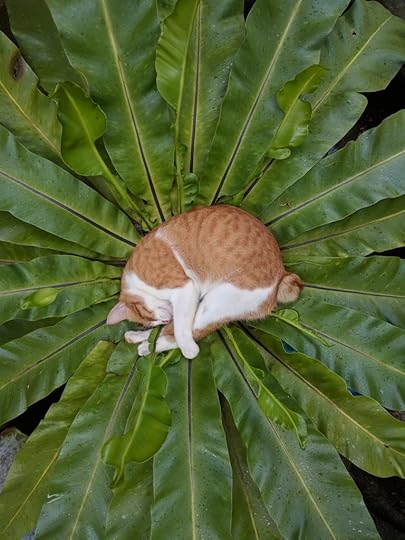
How neatly a cat sleeps,
Sleeps with its paws and its posture,
Sleeps with its wicked claws,
And with its unfeeling blood,
Sleeps with ALL the rings a series
Of burnt circles which have formed
The odd geology of its sand-colored tail.
I should like to sleep like a cat,
With all the fur of time,
With a tongue rough as flint,
With the dry sex of fire and
After speaking to no one,
Stretch myself over the world,
Over roofs and landscapes,
With a passionate desire
To hunt the rats in my dreams.
I have seen how the cat asleeps
Would undulate, how the night flowed
Through it like dark water and at times,
It was going to fall or possibly
Plunge into the bare deserted snowdrifts.
Sometimes it grew so much in sleep
Like a tiger’s great-grandfather,
And would leap in the darkness over
Rooftops, clouds and volcanoes.
Sleep, sleep cat of the night with
Episcopal ceremony and your stone-carved moustache.
Take care of all our dreams
Control the obscurity
Of our slumbering prowess
With your relentless HEART
And the great ruff of your tail.
Ode to the cat
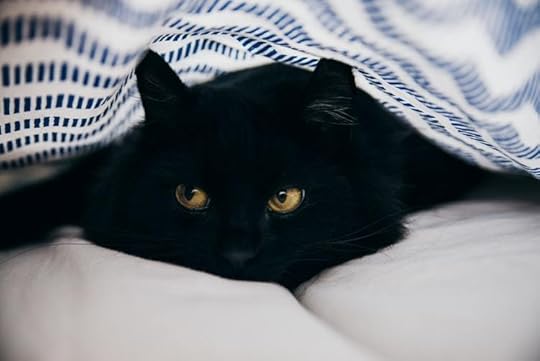
The animals were imperfect,
long tails, sad-looking
heads.
Little by little they started
to improve,
making themselves part of the landscape,
acquiring spots, grace, flight.
The cat,
only the cat,
appeared complete
and proud:
born completely finished,
walks alone and knows what it wants.
A man wants to be a fish and a bird,
the serpent would like to have wings,
the dog is a disoriented lion,
the engineer wants to be a poet,
the fly studies to be a swallow,
the poet tries to imitate the fly,
but the cat
only wants to be a cat
and every cat is a cat
from whiskers to tail,
from sensing the presence of a live rat,
from the night to his golden eyes.
There is no single unit
like him,
neither the moon nor the flower
have such a physique;
it is only one thing
like the sun or the topaz,
and the resilient line of its contour
firm and subtle as is
the line of the prow of a ship.
Its yellow eyes
left a single
slot
to drop in the night’s coins.
Oh little emperor without a world,
conqueror without a homeland,
minuscule tiger of the living room, nuptial
sultan of the ceiling of erotic tiles,
the wind of love in the open air,
you claim when you pass by
and you pose four delicate feet
on the floor, smelling, suspicious
of everything terrestrial,
because everything is foul
to the immaculate foot of the cat.
Oh independent beast of the house,
arrogant vestige of the night,
lazy, gymnastic and foreign,
profoundly a cat, secret police
of the bedrooms, an insignia of
vanished velvet.
Surely there is no mystery
in your method.
Perhaps you aren’t mysterious.
The whole world knows you and you belong
to the inhabitant less mysterious.
Maybe everyone believes it,
everyone believes they are the owners and proprietors,
the cat’s uncles, companions,
colleagues, disciples or friends
of their cat.
I don’t.
I don’t subscribe to that.
I don’t know the cat.
I know everything; life and its archipelago,
the sea and the immense city,
botany, the gynoecium with its deviations,
the plus and minuses of mathematics,
the volcanic funnels of the world,
the unreal hide of the crocodile,
the ignored kindness of firemen,
the blue atavism of the priest,
but I cannot figure out a cat.
My logic slipped in his indifference,
his eyes have golden numbers.
Want to know more about the cat in history, art and literature? Then Revered and Reviled is the book for you. Now available on Amazon in both paperback and Kindle formats.
(function(d, s, id) { var js, fjs = d.getElementsByTagName(s)[0]; if (d.getElementById(id)) return; js = d.createElement(s); js.id = id; js.src = "//forms.aweber.com/form/19/57628519.js&... fjs.parentNode.insertBefore(js, fjs); }(document, "script", "aweber-wjs-6vneq2vrs"));
The post Cat Poems – Pablo Neruda appeared first on THE GREAT CAT.
Related posts: Cat Superstitions by Country
Cat Superstitions by Country 10 Most Expensive Cat Breeds in the World
10 Most Expensive Cat Breeds in the World The Legend of the Yule Cat
The Legend of the Yule Cat
May 7, 2021
Tama Cat
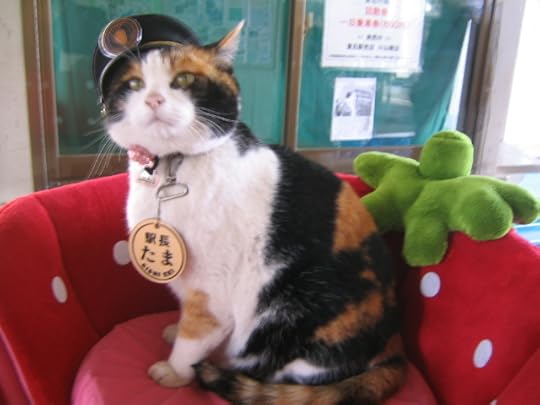
Tama, the stationmaster of Kishi Station, Wakayama Electric Railway, located in Kinokawa, Wakayama, Japan photo by Sanpei
Tama (1999-2015) was a stray female calico cat who became the railway station master of Kinokawa, Wakayama, Japan in 2007. Tama was not paid a salary, but instead received all the cat food she wanted and a gold name collar. Tama’s main duty was to greet passengers. Due to publicity and her own sweet nature, Tama became well known, and the railway ridership greatly increased. Through the years, Tama was given numerous promotions and more impressive titles. Tama also appeared in magazines, newspapers, and TV shows across Japan.

The female cat Tama resides since 2007 as a station manager at the Kishi station in Kinokawa, Wakayama Prefecture (Japan) Takobou photo credit
She was even given her own office with a private litter box. After her death at age 16, she was given a Shinto burial and has a Shinto shrine in her memory. Another calico cat, Nitama, who was Tama’s apprentice, took over her position after her death.

Tama’s Shinto Shrine, photo by Kishuji Rapid
Want to know more about the cat in art, history and literature? Then Revered and Reviled is the book for you. Now available on Amazon in both paperback and Kindle formats.
(function(d, s, id) { var js, fjs = d.getElementsByTagName(s)[0]; if (d.getElementById(id)) return; js = d.createElement(s); js.id = id; js.src = "//forms.aweber.com/form/19/57628519.js&... fjs.parentNode.insertBefore(js, fjs); }(document, "script", "aweber-wjs-6vneq2vrs"));
The post Tama Cat appeared first on THE GREAT CAT.
Related posts: Towser
Towser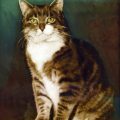 Room 8
Room 8 Mike, The British Museum Cat (1909-1929)
Mike, The British Museum Cat (1909-1929)
December 23, 2020
The Cat on the Dovrefjell Christmas Story
An ancient Nordic Christmas tale The Cat on the Dovrefjell Christmas Story was retold by Peter Christen Asbjørnsen and Jørgen Moe in Norske Folkeeventyr, published 1841.
Once upon a time there was a man up in Finnmark who had caught a great white bear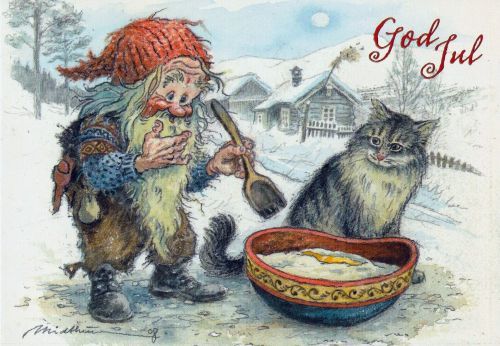 , which he was going to take to the King of Denmark. Now, it so fell out, that he came to the Dovrefell just about Christmas Eve, and there he turned into a cottage where a man lived, whose name was Halvor, and asked the man if he could get house-room there for his bear and himself.
, which he was going to take to the King of Denmark. Now, it so fell out, that he came to the Dovrefell just about Christmas Eve, and there he turned into a cottage where a man lived, whose name was Halvor, and asked the man if he could get house-room there for his bear and himself.
“Heaven never help me, if what I say isn’t true!” said the man; “but we can’t give anyone house-room just now, for every Christmas Eve such a pack of Trolls come down upon us, that we are forced to flit, and haven’t so much as a house over our own heads, to say nothing of lending one to anyone else.”
“Oh?” said the man, “if that’s all, you can very well lend me your house; my bear can lie under the stove yonder, and I can sleep in the side-room.”
Well, he begged so hard, that at last he got leave to stay there; so the people of the house flitted out, and before they went, everything was got ready for the Trolls; the tables were laid, and there was rice porridge, and fish boiled in lye, and sausages, and all else that was good, just as for any other grand feast.
So, when everything was ready, down came the Trolls. Some were great, and some were small; some had long tails, and some had no tails at all; some, too, had long, long noses; and they ate and drank, and tasted everything. Just then one of the little Trolls caught sight of the white bear, who lay under the stove; so he took a piece of sausage and stuck it on a fork, and went and poked it up against the bear’s nose, screaming out:
“Pussy, will you have some sausage?”
Then the white bear rose up and growled, and hunted the whole pack of them out of doors, both great and small.
Next year Halvor was out in the wood, on the afternoon of Christmas Eve, cutting wood before the holidays, for he thought the Trolls would come again; and just as he was hard at work, he heard a voice in the wood calling out:
“Halvor! Halvor!”
“Well,” said Halvor, “here I am.”
“Have you got your big cat with you still?”
“Yes, that I have,” said Halvor; “she’s lying at home under the stove, and what’s more, she has now got seven kittens, far bigger and fiercer than she is herself.”
“Oh, then, we’ll never come to see you again,” bawled out the Troll away in the wood, and he kept his word; for since that time the Trolls have never eaten their Christmas brose with Halvor on the Dovrefell. Thus is the ending of The Cat on the Dovrefjell Christmas Story.
Want to know more about the cat in literature, art and history? Then Revered and Reviled is the book for you. Now available on Amazon in both paperback and Kindle formats.
(function(d, s, id) {
var js, fjs = d.getElementsByTagName(s)[0];
if (d.getElementById(id)) return;
js = d.createElement(s); js.id = id;
js.src = "//forms.aweber.com/form/19/57628519.js&...
fjs.parentNode.insertBefore(js, fjs);
}(document, "script", "aweber-wjs-6vneq2vrs"));
The post The Cat on the Dovrefjell Christmas Story appeared first on THE GREAT CAT.
Related posts:
 The Christmas Cat, The Cat Who Loved Christmas
The Christmas Cat, The Cat Who Loved Christmas The Legend of the Yule Cat
The Legend of the Yule Cat Cat Superstitions by Country
Cat Superstitions by Country
December 10, 2020
The Legend of the Yule Cat
The legend of the Yule Cat is a Christmas story that is celebrated and told to Icelandic children even today. Every year a large Christmas cat is erected in the Laekjartorg square in Reykjavik.

Based on Icelandic folklore, the poem, The Christmas Cat, written by the poet Jóhannes úr Kötlum (1899-1972), describes a gigantic and very dangerous cat that prowls the snowy countryside and catches people instead of mice during Christmas.
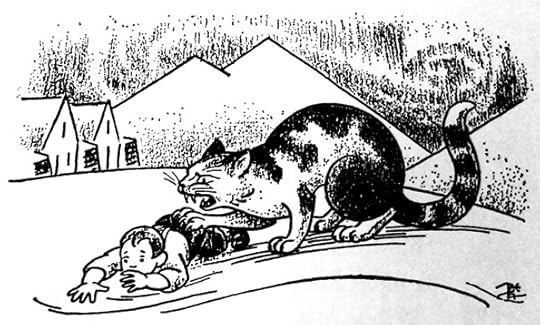
You know the Christmas cat
– that cat is very large.
We don’t know where he came from
nor where he has gone.
He opened his eyes widely
glowing both of them.
It was not for cowards
to look into them.
His hair sharp as needles
his back was high and bulgy and claws on his hairy paw
were not a pretty sight.
Therefore the women competed
to rock and sow and spin
and knitted colorful clothes
or one little sock.
For the cat could not come
and get the little children.
They had to get new clothes
from the grownups.
When Christmas eve was lighted
and the cat looked inside
the children stood straight and red-cheeked
with their presents.
He waved his strong tail,
he jumped, scratched and blew
and was either in the valley
or out on the headland.
He walked about, hungry and mean
in hurtfully cold Christmas snow
and kindled the hearts with fear
in every town.
If outside one heard a weak “meow”
then unluck was sure to happen.
All knew he hunted men
and didn’t want mice.
He followed the poorer people
who didn’t get any new clothing
near Christmas – and tried and lived
in poorest conditions.
From them he took at the same time
all their Christmas food
and ate them also if he could.
Therefore the women competed
to rock and sow and spin
and knitted colorful clothes
or one little sock.
Some had gotten an apron
and some had got a new shoe
or anything that was needful.
But that was enough
For pussy should not eat no-one
who got some new piece of clothes.
He hissed with his ugly voice
and ran away.
If he still exists, I don’t know.
But for nothing would be his trip
if everybody would get next Christmas
some new rag.
You may want to keep it in mind
to help if there is need.
For somewhere there might be children
who get nothing at all.
Perhaps that looking for those who suffer
from lack of plentiful lights
will give you a happy season
and Merry Christmas.

The Yule Cat story or as it is titled in Icelandic, Jólakötturinn, is said to have originated during the Dark Ages even though the oldest written versions of the story are from the 19th century. The story relates how Medieval employers would reward their employees for their hard work with new clothes and shoes every Christmas. However, if you were lazy and were not rewarded with new clothes, the Yule Cat would come and eat you. A new twist to the story is if you give new clothes to someone, you will not be eaten. The story is obviously meant for children to encourage them to be productive and avoid laziness.
The Netflix film, The Christmas Chronicles 2 features the Yule Cat.
Want to know more about the cat in literature, art and history? Then Revered and Reviled is the book for you. Now available on Amazon in both paperback and Kindle formats.
(function(d, s, id) {
var js, fjs = d.getElementsByTagName(s)[0];
if (d.getElementById(id)) return;
js = d.createElement(s); js.id = id;
js.src = "//forms.aweber.com/form/19/57628519.js&...
fjs.parentNode.insertBefore(js, fjs);
}(document, "script", "aweber-wjs-6vneq2vrs"));
The post The Legend of the Yule Cat appeared first on THE GREAT CAT.
Related posts:
 Cat Superstitions by Country
Cat Superstitions by Country The Christmas Cat, The Cat Who Loved Christmas
The Christmas Cat, The Cat Who Loved Christmas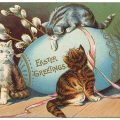 How the Willows Came to be Called Pussy Willows
How the Willows Came to be Called Pussy Willows
October 22, 2020
Towser

Photo Courtesy of Glenturret Distillery, Lucy Armstrong
Towser was a Scottish long haired tortoise shell cat (21 April 1963-20 March 1987) who lived for almost 24 years, her entire life, in the Glenturret Distillery. There she kept the barely stores free of mice killing approximately three a day. In fact, Towser is famous for holding the Guinness Book of Records for killing the most mice in her lifetime, 28,899. Of course, this number of mice was not actually counted over the years, but instead was gleaned from observing Towser over a few days and then coming up with an average daily kill. Even though the figure may not be exactly correct, just the same, it is definitely impressive. Perhaps her mousing prowess can be chalked up to having a bit of whiskey added to her milk each night.

Photo courtesy of Glenturret Distillery, Lucy Armstrong

Photography courtesy of Glenturret Distillery, Lucy Armstrong
In celebration of Towser, the distillery created Fairlie’s Light Highland Liqueur which featured Towser’s pawprints on the logo decorating the bottles. Sadly, the liqueur has been discontinued.
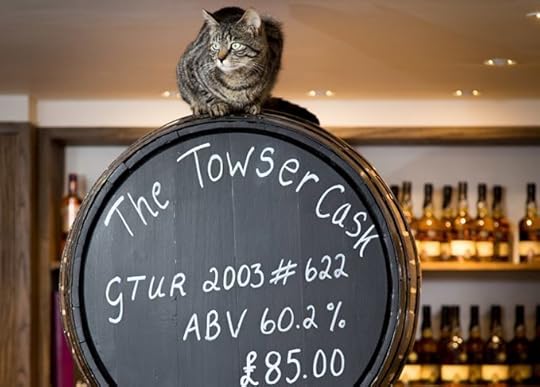
Glenturret – The Towser Cask Photo by Fraser Band
However, Towser’s fame still lives on today where the people of Glenturret erected a bronze statue of her. Even though Towser has had several successors, none of them have ever been able to match her mousing skills.
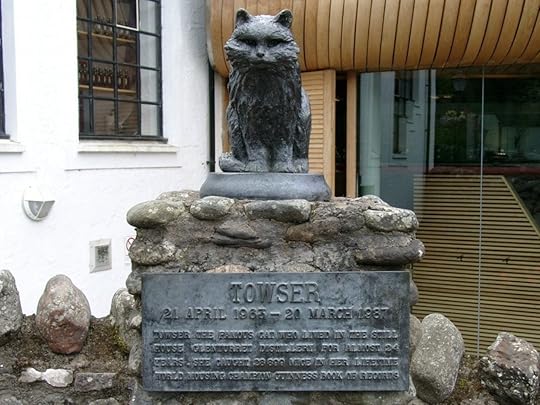
Want to know more about the cat in art, history and literature? Then Revered and Reviled is the book for you. Now available on Amazon in both paperback and Kindle formats.
(function(d, s, id) {
var js, fjs = d.getElementsByTagName(s)[0];
if (d.getElementById(id)) return;
js = d.createElement(s); js.id = id;
js.src = "//forms.aweber.com/form/19/57628519.js&...
fjs.parentNode.insertBefore(js, fjs);
}(document, "script", "aweber-wjs-6vneq2vrs"));
The post Towser appeared first on THE GREAT CAT.
Related posts:
 Mike, The British Museum Cat (1909-1929)
Mike, The British Museum Cat (1909-1929) Room 8
Room 8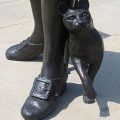 Trim, the Ship’s Cat
Trim, the Ship’s Cat


